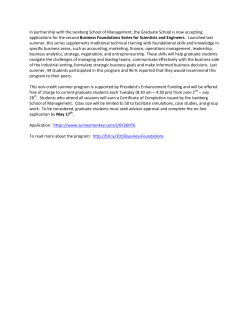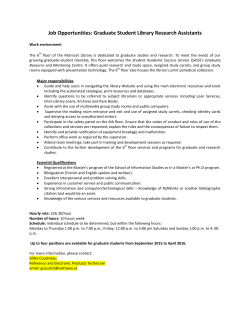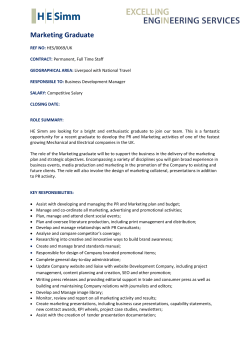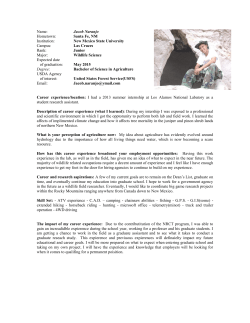
Tips for Graduate School - Department of Psychology
Tips to A Successful Undergraduate Career Getting Ready Timeline: The process of getting into a graduate program or receiving a job offer starts your first year as an Undergraduate student. All of this is not a spur of the moment decision and takes time to accomplish. There are a variety of activities that you must engage in to be somewhat ready and successful in your search. Set short term and long term goals to keep your eye on the prize. We recommend you start Now!! Some things to consider: Year 1: Familiarize yourself with communication tools: Email, Newsletter, Departmental Websites, Degree Audit System, StuInfo, etc… Verify and notate academic deadlines such as drop/add dates, withdrawal, refund, etc… Meet with an Academic Advisor: plan and review degree requirements, learn about resources Investigate ways to enhance your degree: specializations, minors, additional majors Get involved through student groups, organizations, residence halls: volunteering, leadership Meet with a Career Advisor: start college resume, engage in mock interviews, research job outlook Create academic and career plan: courses and activities for enhancement Attend academic and career seminars and workshops Check into study abroad or study away opportunities Prepare for future enrollment Tips: Think outside the box & classroom Don’t procrastinate Meet with instructors during office hours Year 2: Review and update academic plan Meet with Career Advisor: update resume & career goals Career exploration: investigate 2-3 career paths Attend Career Fairs to learn about what is expected Engage in experiential-learning activities: volunteer, job shadow, mentor, informational interviews Pursue leadership roles in student groups Search and sign up for research opportunities Find a summer job or internship Get to know at least two faculty Tips: Make it a priority to get to know two faculty each semester for insight, strategies to succeed, career/major focus Year 3: Sharpen necessary skills for internships, jobs, graduate program, career, etc… Assess and evaluate academic record Gain more research experience Update resume Attend career fairs and create a list of potential employers Conduct/participate in mock interviews Find a summer job or internship opportunity Investigate and compile graduate school admissions requirements Plan, study, and schedule for graduate testing: GRE, MCAT, LSAT, GMAT, etc… Create and update profiles on Facebook and LinkedIn Attend regional professional conferences and seminars Summer Take graduate/professional tests Create job/graduate school application time line Visit schools/programs Create list of contacts for letters of recommendation/references: name, address, phone, email Six months minimum to find a job, don’t wait until the last minute to start looking. Start NOW. Year 4: Summer after 3rd year, take graduate test Complete degree audit/certification with academic advisors Request letters of recommendations Apply to graduate schools and/or jobs Attend career fairs and network with potential employers Do Web search for jobs Prepare for graduate school and job interviews Summer Send thank you notes to recommenders/references Get final copy of transcript showing graduation date Make sure diploma is received Last Words: Receiving your degree is a great accomplishment. This process above helps you to fully realize not only the steps you need to take but also be aware of what you need to do to reach your goals. Junior Year Research prospective programs Take GRE end of summer early fall Contact programs for info. Senior Year Get letters of recommendation 4-6 wks. before app is due. Start applications in early fall Submit complete application package before deadline Request & send transcripts References “Grad School Guide”. Retrieved June, 21, 2009 from http://ww.gradschooltips.com Department of Psychology ● Undergraduate Office ● 100 Psychology Bldg ● 517-353-7271 ● http://psychology.msu.edu Revised 2/2013
© Copyright 2025




















